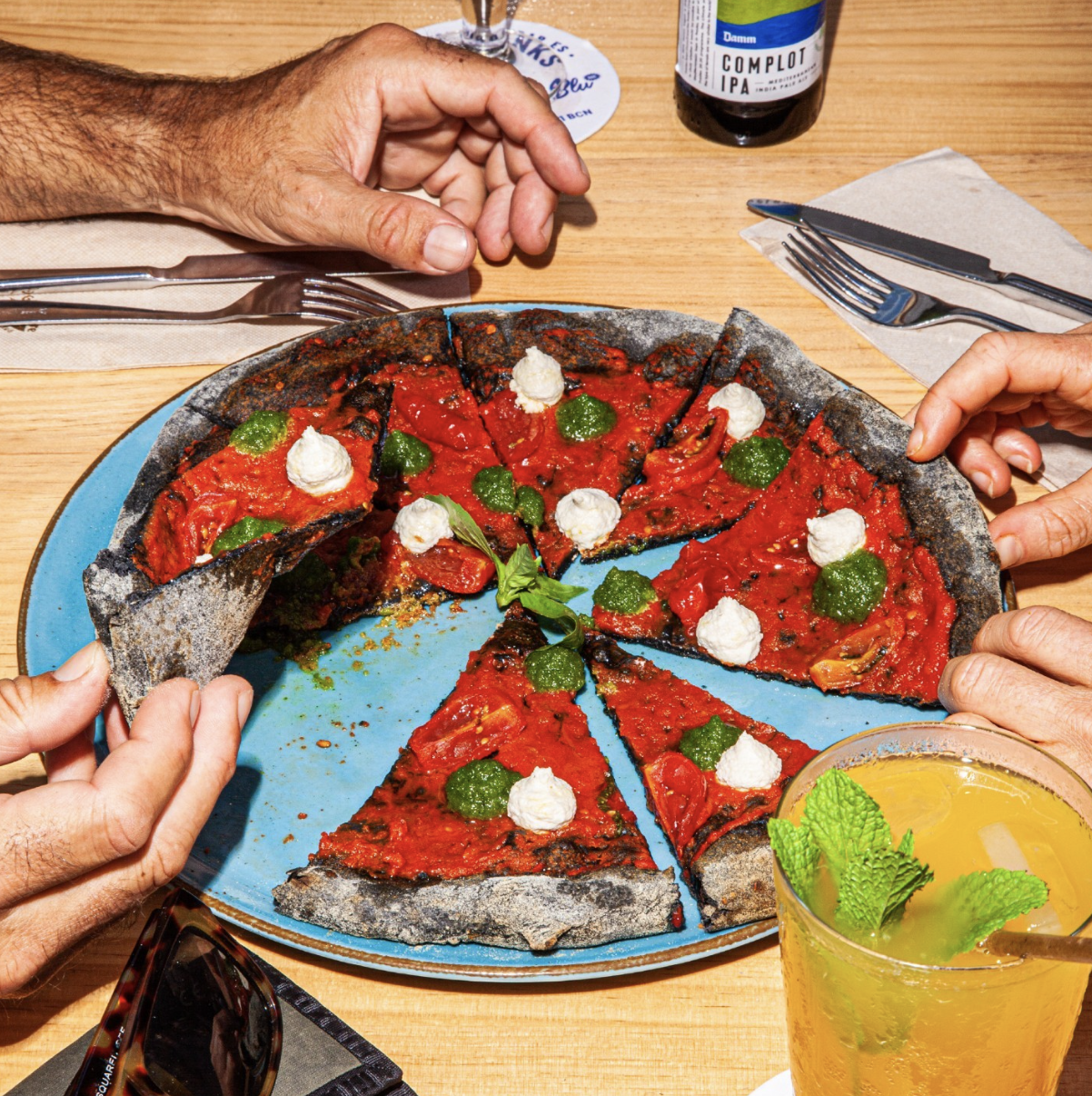Barcelona is like a dream. Melting, proto-psychedelic architecture from Antoni Gaudí neighbors the elegant shopping district along Passeig de Gràcia; the narrow medieval maze of the Barri Gòtic (Gothic Quarter) opens to the famous and teeming thoroughfare La Rambla; vibrant street art enlivens seawalls next to sun-drenched urban beaches; leafy parks provide settings for unique museums. A cosmopolitan, urban metropolis between dark hills and the blue Mediterranean, modern Barcelona has become a global beacon of progressive lifestyle.
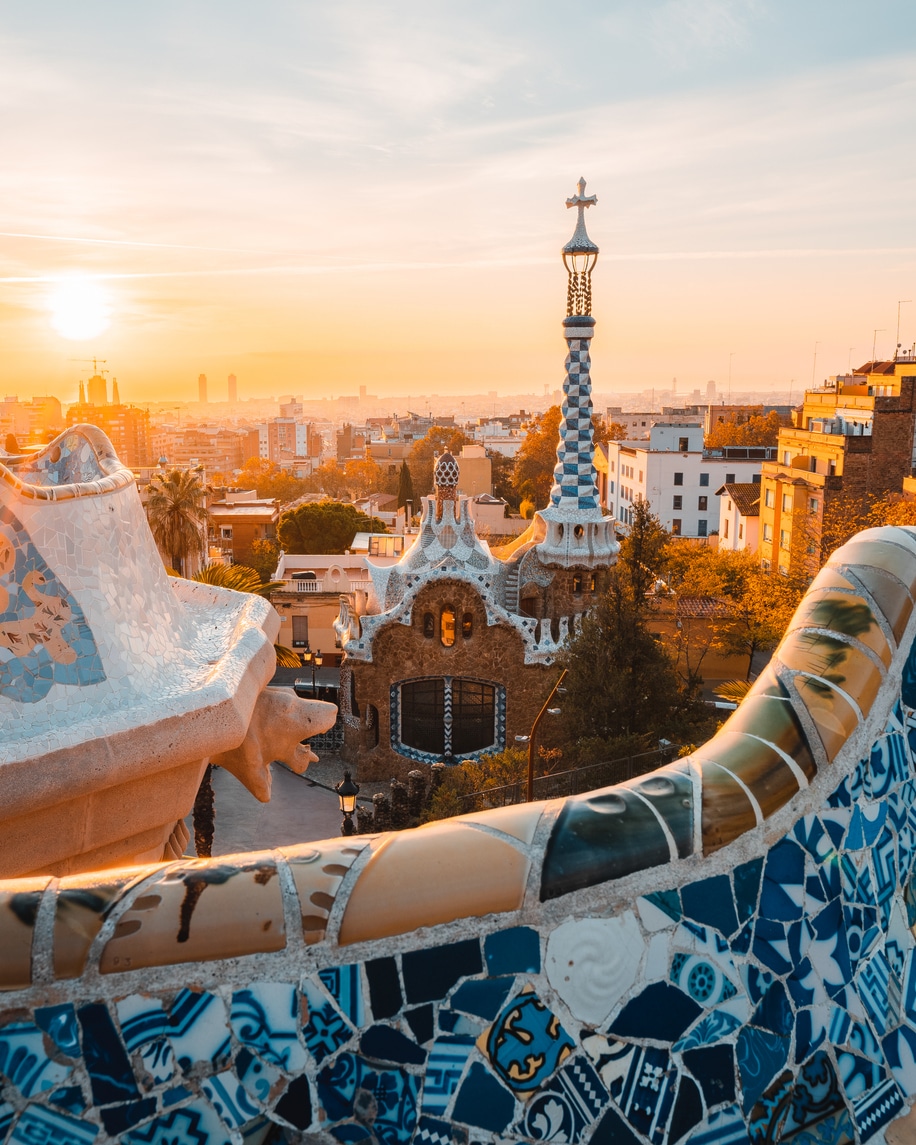 Barcelona’s whimsical, Gaudí-designed Park Güell/Getty
Barcelona’s whimsical, Gaudí-designed Park Güell/Getty
Naturally, this includes a lively plant-based current. The city is home to around 50 vegan restaurants, a number of local vegan festivals, and numerous vegan shops. It’s the kind of place where, wandering around one morning looking for breakfast, I stumbled across not one but two different cafés—Santa Vegana and the Vegan Corner—a short walk from my hotel. Both got me going with flaky vegan croissants, vegan Spanish tortilla (a savory cake of potato, leeks, and vegan eggs), tomato toast (a Catalan classic that is simply a ripe tomato rubbed onto toasted rolls), and vivifying espresso.
 Bungnuts doughnut filled with strawberry jam and covered with lotus cream
Bungnuts doughnut filled with strawberry jam and covered with lotus cream
Options in Barcelona run from traditional foods like tapas and global cuisines (Mexican at Gallo Santo is superb, and includes hard-to-find dishes like pozole) to wildly inventive fusion and thoughtful slow food. There are even massive, preposterous doughnuts at vegan hole-in-the-wall Bungnuts.
Barcelona’s diverse vegan eateries
I began at Cat Bar, one of the oldest vegan restaurants in Barcelona. A moody spot hidden in the twists and turns of the Barri Gòtic, this punky bar serves homemade burgers as ideal foils to its real agenda: a carefully curated selection of local craft beers. “This was the first vegan craft beer restaurant in Southern Europe,” says owner Roy Silcocks, who worked with local brewers to ensure that they use a fully vegan brewing process. A pint of English Bitters from local brewery Freddo Fox was perfect next to a hearty Champion Cat Burger, a richly savory, mushroom-flecked patty on a housemade bun with the works.
Next, I went to Blu Bar to see how far Barcelona’s vegan scene had come. In the trendy Poblenou district, not far from the beach, Blu Bar is a hopping, bright space spilling onto sunny outdoor seating. Pizzas are the heart of the menu; the Don’t Call Me Margherita was crisp and succulent with juicy, ripe tomatoes and the zing of fresh garlic and arugula pesto atop dollops of cashew cheese. Blu Bar’s pizza oven works overtime: buns for sandwiches like the Pulled Pork Goes Happy are freshly baked to order from rounds of pizza dough. They make for a toothsome bite that contrasts the messy, mouthwatering innards of sundried tomato- and walnut-based pulled “pork,” vegan mayo, barbecue sauce, coleslaw, pickled onions, and cilantro.
“Our main motivation is to make people happy and to bring them close to this lifestyle,” says Dario Lombardi, one of the owners of Blu Bar. “The special ingredient is love.”
This sentiment could be the motto for Barcelona vegan dining as a whole. “If you really want to change things, you need to make it easy for people,” says Roots & Rolls owner Sandra de Jong. The sushi fusion restaurant is a big, bright postindustrial space with a spare Scandinavian design aesthetic in the sprawling Eixample district not far from some of Gaudí’s masterpieces.
“In the past five years, the mindset in Barcelona has changed a lot; people are more willing to try vegan food. Every dish we serve is another drop in the ocean,” she continues.
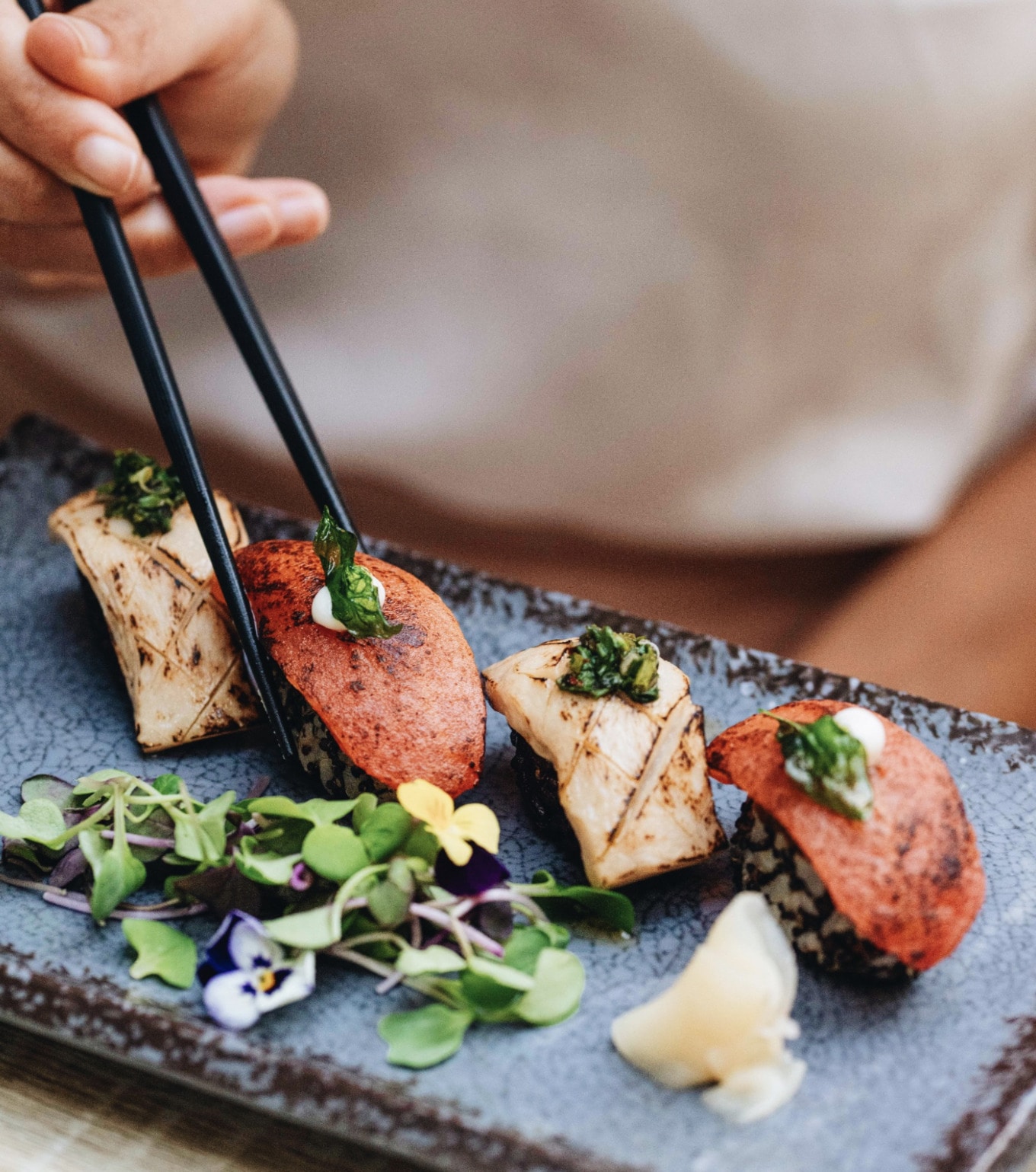 Marinated king oyster mushroom and plum tomato nigiri at Roots & Rolls
Marinated king oyster mushroom and plum tomato nigiri at Roots & Rolls
The Geisha roll, Roots & Rolls’ most popular, is a complex arrangement of avocado maki encrusted in gluten-free panko topped with a marinated tartare, rolled in black quinoa rice, and drizzled with fermented chili sauce. It blends textures and temperatures—the top is soft and cool while the base is crispy and warm–in a complex and satisfying dance.
And that tartare? It’s made by Barcelona plant-based protein company Heura. The company’s versatile chicken-like product appears on menus throughout the region, one indication that Barcelona is a hub of vegan innovation. Visit Farmers Veggies Butchers for vegan versions of traditional sausages like chorizo and botifarra. Drop by vegan cheesemaker Väcka for sublime vegan selections ranging from an elegant, creamy “Mözza’’ to a truly convincing, white-rinded “Vrie.” Or look for these and other local vegan products at the two locations of Barcelona’s vegan grocery store Vegacelona.
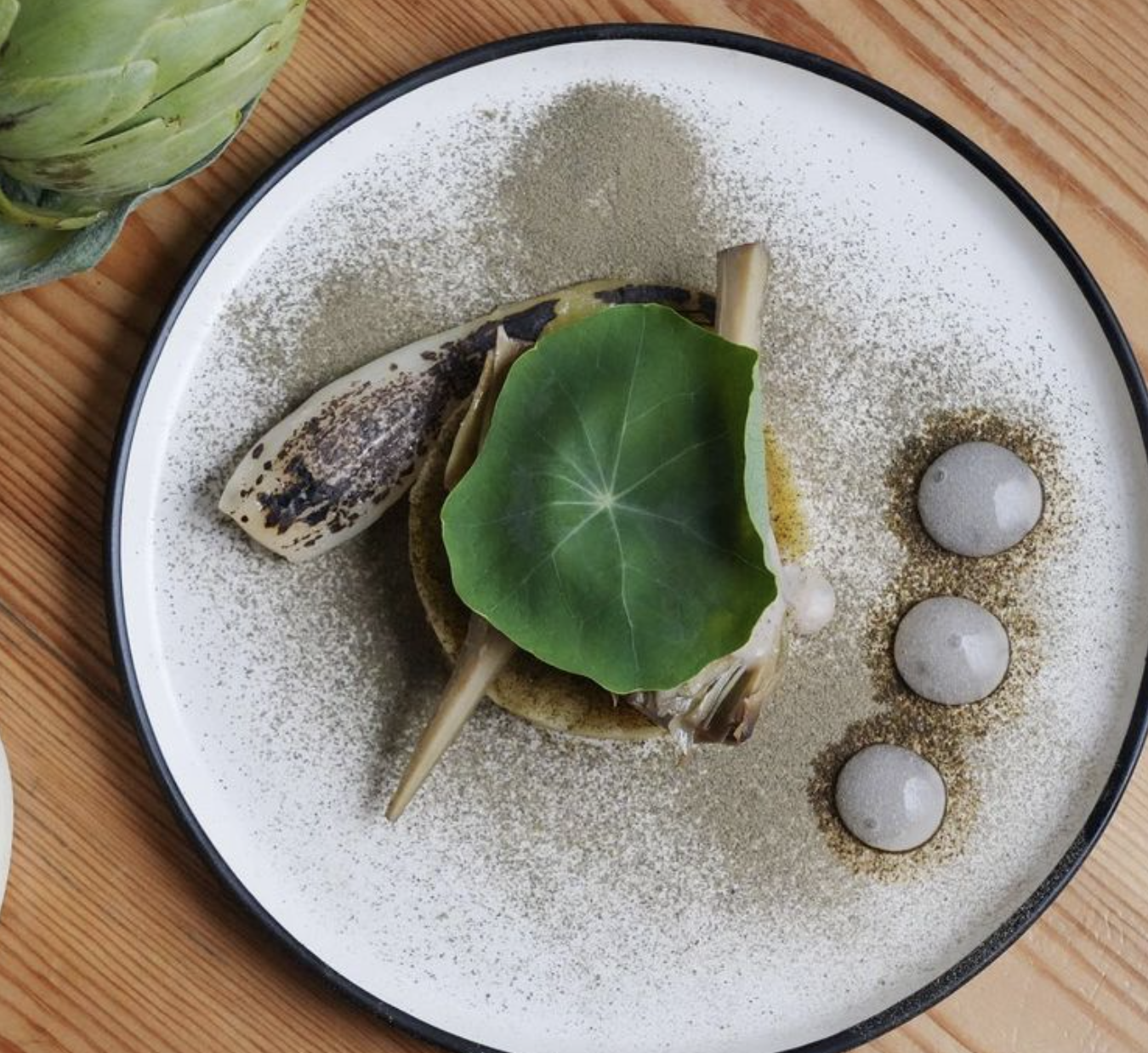 Artichokes prepared with pickles, mashed potatoes, fresh onions, and fermented leaves juice at Rasoterra
Artichokes prepared with pickles, mashed potatoes, fresh onions, and fermented leaves juice at Rasoterra
A plant-focused spin
This is not to say that vegan Barcelona is only about mock meats and cheeses. At Rasoterra, a cozy and elegant spot in the Barri Gòtic, co-owner Daniele Rossi and his staff eschew anything of the sort. Instead, they craft beautiful, sculptural dishes from local, seasonal organic produce. The restaurant has close relationships with nearby farmers, allowing them to coordinate the menu with the season seamlessly. The food, which changes regularly, is paired with a fine selection of local, natural wines.
Ajoblanco, a traditional Spanish cold soup made from Marcona almonds, was silky and creamy, carrying the aroma of roasted garlic balanced on the sweetness of minced peach. This dish, which is local, seasonal, and delicious, epitomizes Rasoterra’s ethos.
“We want people who come through that door to understand very well where they are,” says Rossi, who is one of the founders of the Slow Food chapter in Barcelona. “Here, they are in Europe, in Spain, in Catalonia, in Barcelona.”
Rasoterra makes the most of the regional bounty with inventive and playful dishes like vivacious paccheri pasta with seaweed pesto or a curry of red beets and sticky rice studded with tiny balls of chickpea sorbet. Even the desserts drip with terroir: a confection of smoked figs, sponge cake, and yuzu sorbet drizzled with fig leaf oil was like sitting in the shade of a fig tree on one of Catalonia’s rural lanes; a tomato in three textures (poached in syrup, powdered skin, and ganache) left no mistake that I was in Barcelona at the height of tomato season.
All about indulgence
Vegan Junk Food Bar in the Born district could be Rasoterra’s exact opposite. From the entrance, a riot of street-art-inflected pink and black begins the assault on the senses that culminates in absurd—and absurdly delicious—hyperrealist vegan food. VJFB, which originated in Amsterdam (there are now seven locations), leans into the kind of heavy, fried, and sauce-drenched fare that hits that special spot right in your gut. “We are what we say we are,” says Barcelona location manager Angelica Terzoli. “Junk food for us is juicy, fried, comfort food you can’t stop eating.”
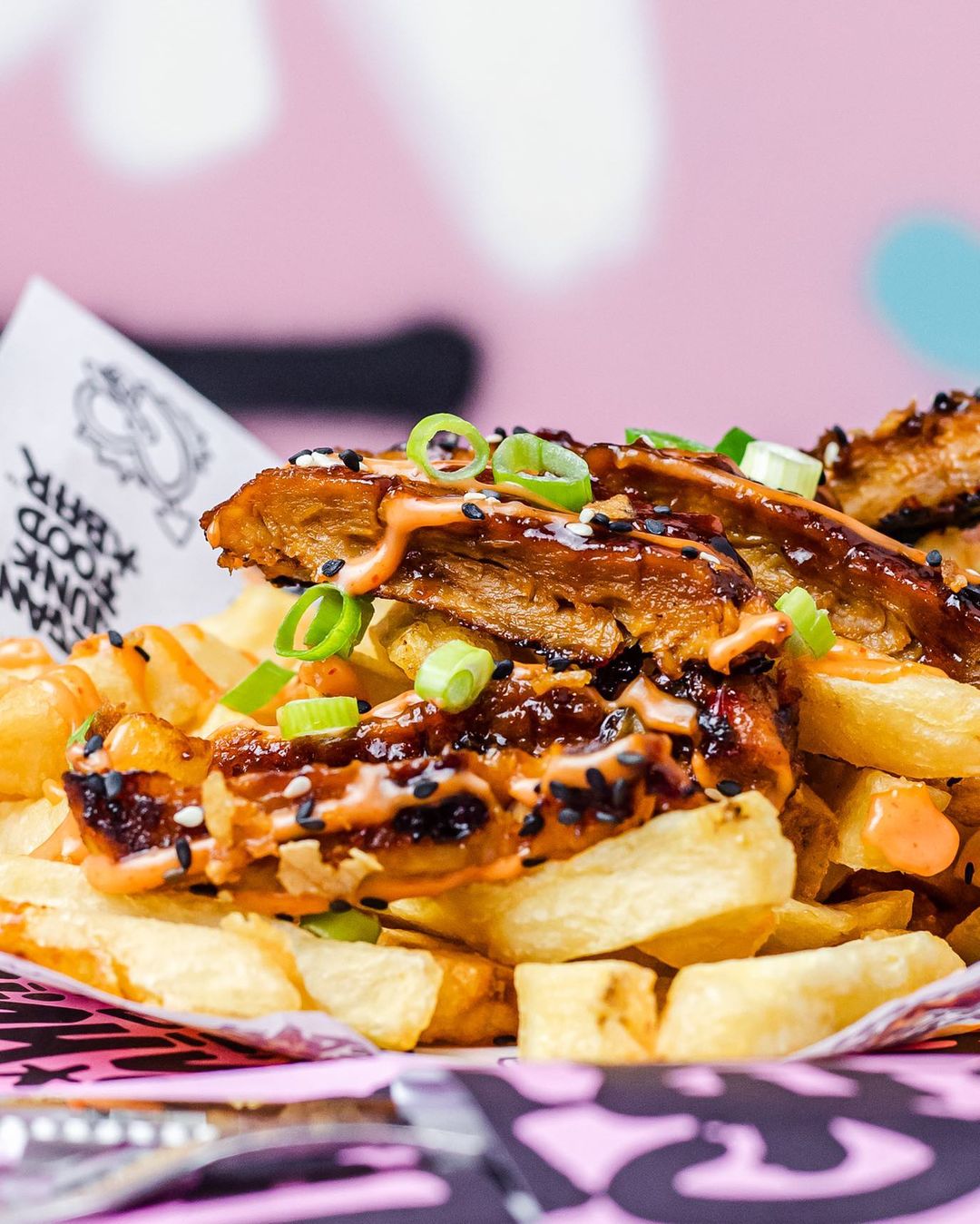 Vegan Junk Food Bar’s Heppi Ribs
Vegan Junk Food Bar’s Heppi Ribs
Despite its aggressive playfulness, VJFB works hard to get it right. The company makes many of its own mock meats and builds dishes with a careful authenticity. The VJFBBQ Heppi Ribs burger sees savory, moist ribs smattered with “Hot Spicy Chick’’ sauce, plus lettuce and pickles, piled on pink and black buns. The Fizz XO—a crispy cod-like patty with tender flaky flesh on a black bun with “Pinky Garlic’’ sauce—was the best-tasting vegan fish patty I have ever tried.
Finally, deep in the charming Gràcia neighborhood, on a plaza fronted by a 19th-century stone church, I discovered the unassuming gelato shop AMMA Gelato that epitomizes the combination. “We aim to be the best in the city, vegan or not,” says founder Arthur Mudde. AMMA’s classic but unpretentious menu features both refreshing simplicity (the house cacao gelato is made with just Ecuadorian cacao, dates, and water) and enough creativity to pique one’s interest (the Avo-Coco-Lime conjures up tropical islands and is advertised to the flavor-curious).
Sitting on the steps of the church, licking pensively at my cone of choice—Sicilian pistachio—I watched kids kick a ball around under leafy plane trees as golden late afternoon light spilled through the plaza. Their laughter echoed through the square the way the rich nutty sweetness of the gelato pirouetted across my tongue. It was the flavor of Barcelona itself.
